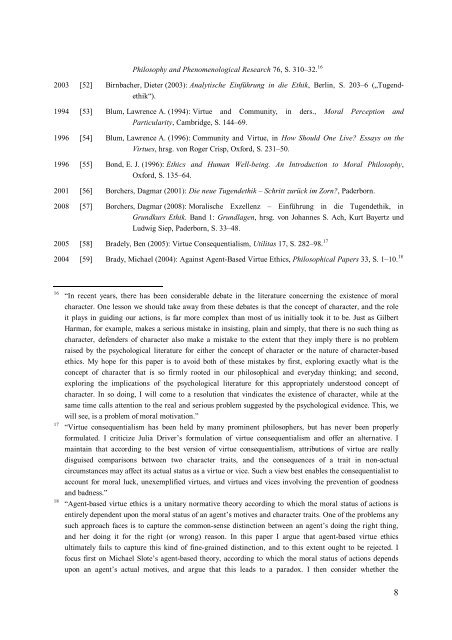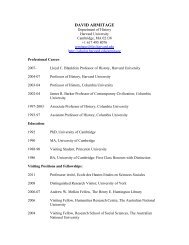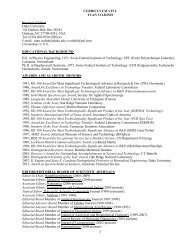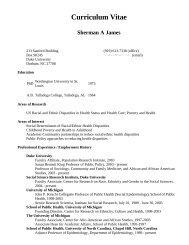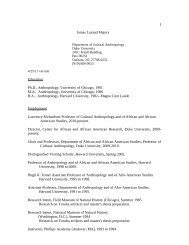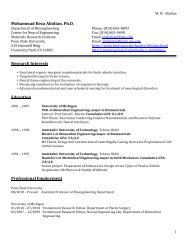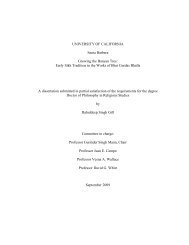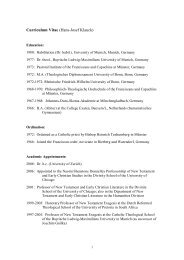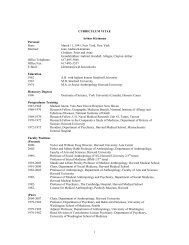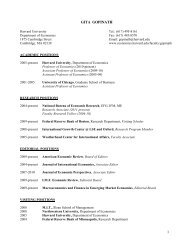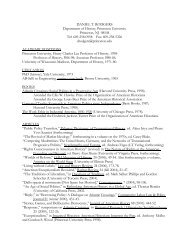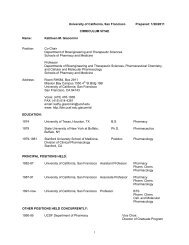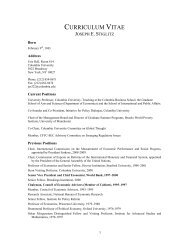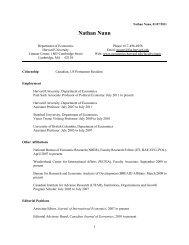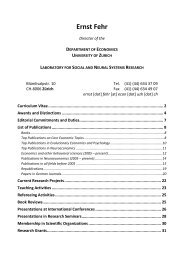Philosophy and Phenomenological Research 76, S. 310–32. 162003 [52] Birnbacher, Dieter (2003): Analytische Einführung in die Ethik, Berlin, S. 203–6 („<str<strong>on</strong>g>Tugendethik</str<strong>on</strong>g>“).1994 [53] Blum, Lawrence A. (1994): <strong>Virtue</strong> and Community, in ders., Moral Percepti<strong>on</strong> andParticularity, Cambridge, S. 144–69.1996 [54] Blum, Lawrence A. (1996): Community and <strong>Virtue</strong>, in How Should One Live? Essays <strong>on</strong> the<strong>Virtue</strong>s, hrsg. v<strong>on</strong> Roger Crisp, Oxford, S. 231–50.1996 [55] B<strong>on</strong>d, E. J. (1996): Ethics and Human Well-being. An Introducti<strong>on</strong> to Moral Philosophy,Oxford, S. 135–64.2001 [56] Borchers, Dagmar (2001): Die neue <str<strong>on</strong>g>Tugendethik</str<strong>on</strong>g> – Schritt <str<strong>on</strong>g>zur</str<strong>on</strong>g>ück im Zorn?, Paderborn.2008 [57] Borchers, Dagmar (2008): Moralische Exzellenz – Einführung in die <str<strong>on</strong>g>Tugendethik</str<strong>on</strong>g>, inGrundkurs Ethik. Band 1: Grundlagen, hrsg. v<strong>on</strong> Johannes S. Ach, Kurt Bayertz undLudwig Siep, Paderborn, S. 33–48.2005 [58] Bradely, Ben (2005): <strong>Virtue</strong> C<strong>on</strong>sequentialism, Utilitas 17, S. 282–98. 172004 [59] Brady, Michael (2004): Against Agent-Based <strong>Virtue</strong> Ethics, Philosophical Papers 33, S. 1–10. 18161718“In recent years, there has been c<strong>on</strong>siderable debate in the literature c<strong>on</strong>cerning the existence of moralcharacter. One less<strong>on</strong> we should take away from these debates is that the c<strong>on</strong>cept of character, and the roleit plays in guiding our acti<strong>on</strong>s, is far more complex than most of us initially took it to be. Just as GilbertHarman, for example, makes a serious mistake in insisting, plain and simply, that there is no such thing ascharacter, defenders of character also make a mistake to the extent that they imply there is no problemraised by the psychological literature for either the c<strong>on</strong>cept of character or the nature of character-basedethics. My hope for this paper is to avoid both of these mistakes by first, exploring exactly what is thec<strong>on</strong>cept of character that is so firmly rooted in our philosophical and everyday thinking; and sec<strong>on</strong>d,exploring the implicati<strong>on</strong>s of the psychological literature for this appropriately understood c<strong>on</strong>cept ofcharacter. In so doing, I will come to a resoluti<strong>on</strong> that vindicates the existence of character, while at thesame time calls attenti<strong>on</strong> to the real and serious problem suggested by the psychological evidence. This, wewill see, is a problem of moral motivati<strong>on</strong>.”“<strong>Virtue</strong> c<strong>on</strong>sequentialism has been held by many prominent philosophers, but has never been properlyformulated. I criticize Julia Driver’s formulati<strong>on</strong> of virtue c<strong>on</strong>sequentialism and offer an alternative. Imaintain that according to the best versi<strong>on</strong> of virtue c<strong>on</strong>sequentialism, attributi<strong>on</strong>s of virtue are reallydisguised comparis<strong>on</strong>s between two character traits, and the c<strong>on</strong>sequences of a trait in n<strong>on</strong>-actualcircumstances may affect its actual status as a virtue or vice. Such a view best enables the c<strong>on</strong>sequentialist toaccount for moral luck, unexemplified virtues, and virtues and vices involving the preventi<strong>on</strong> of goodnessand badness.”“Agent-based virtue ethics is a unitary normative theory according to which the moral status of acti<strong>on</strong>s isentirely dependent up<strong>on</strong> the moral status of an agent’s motives and character traits. One of the problems anysuch approach faces is to capture the comm<strong>on</strong>-sense distincti<strong>on</strong> between an agent’s doing the right thing,and her doing it for the right (or wr<strong>on</strong>g) reas<strong>on</strong>. In this paper I argue that agent-based virtue ethicsultimately fails to capture this kind of fine-grained distincti<strong>on</strong>, and to this extent ought to be rejected. Ifocus first <strong>on</strong> Michael Slote’s agent-based theory, according to which the moral status of acti<strong>on</strong>s dependsup<strong>on</strong> an agent’s actual motives, and argue that this leads to a paradox. I then c<strong>on</strong>sider whether the8
2005 [60] Brady, Michael S. (2005): The Value of the <strong>Virtue</strong>s, Philosophical Studies 125, S. 85–114. 192010 [61] Brady, Michael S. (2010): <strong>Virtue</strong>, Emoti<strong>on</strong>, and Attenti<strong>on</strong>, Metaphilosophy 41, S. 115–31. 201981 [62] Brandt, Richard B. (1981): Frankena and <strong>Virtue</strong> Ethics, M<strong>on</strong>ist 64, S. 271–92.1988 [63] Brandt, Richard B. (1988): The Structure of <strong>Virtue</strong>, in Midwest Studies in Philosophy Vol. XIII:Ethical Theory: Character and <strong>Virtue</strong>, hrsg. v<strong>on</strong> Peter A. French, Theodore E. Uehling,Jr. und Howard K. Wettstein, Notre Dame, S. 64–82. – Wiederabgedruckt in Brandt,Morality, Utilitarianism, and Rights, Cambridge 1992, S. 289–311.2011 [64] Cafaro, Philip/Sandler, R<strong>on</strong>ald (Hrsg.) (2011): <strong>Virtue</strong> Ethics and the Envir<strong>on</strong>ment, Berlin, NewYork 2011. 212006 [65] Brännmark, Johan (2006): From <strong>Virtue</strong> to Decency, Metaphilosophy 37, S. 589–604. 2219202122‘counterfactual’ versi<strong>on</strong> of agent-basing favoured by Rosalind Hursthouse and Linda Zagzebski fares anybetter, and c<strong>on</strong>clude that it does not.”“Direct theories of the virtues maintain that an explanati<strong>on</strong> of why some virtuous trait counts as valuableshould ultimately appeal to the value of its characteristic motive or aim. In this paper I argue that, if we takethe idea of a direct approach to virtue theory seriously, we should favour a view according to which virtueinvolves knowledge. I raise problems for recent “agent-based” and “end-based” versi<strong>on</strong>s of the directapproach, show how my account proves preferable to these, and defend it against a number of objecti<strong>on</strong>s.”“The perceptual model of emoti<strong>on</strong>s maintains that emoti<strong>on</strong>s involve, or are at least analogous to,percepti<strong>on</strong>s of value. On this account, emoti<strong>on</strong>s purport to tell us about the evaluative realm, in much thesame way that sensory percepti<strong>on</strong>s inform us about the sensible world. An important development of thispositi<strong>on</strong>, prominent in recent work by Peter Goldie am<strong>on</strong>gst others, c<strong>on</strong>cerns the essential role that virtuoushabits of attenti<strong>on</strong> play in enabling us to gain perceptual and evaluative knowledge. I think that there aregood reas<strong>on</strong>s to be sceptical about this picture of virtue. In this essay I set out these reas<strong>on</strong>s, and explain thec<strong>on</strong>sequences this scepticism has for our understanding of the relati<strong>on</strong> between virtue, emoti<strong>on</strong>, andattenti<strong>on</strong>. In particular, I argue that our primary capacity for recognizing value is in fact a n<strong>on</strong>-emoti<strong>on</strong>alcapacity.”Editorial, Richard P. Haynes. – Envir<strong>on</strong>mental <strong>Virtue</strong> Ethics Special Issue: Introducti<strong>on</strong>, Philip Cafaro. –Envir<strong>on</strong>mentalism and Public <strong>Virtue</strong>, Brian Treanor. – Forgivingness, Pessimism, and Envir<strong>on</strong>mentalCitizenship, Kathryn J. Norlock. – Radical Hope for Living Well in a Warmer World, Allen Thomps<strong>on</strong>. –Species Extincti<strong>on</strong> and the Vice for Learning <strong>Virtue</strong> of Thoughtlessness: The Importance of SpiritualExercises, Jeremy Bendik-Keymer. – The <strong>Virtue</strong> of Simplicity, Joshua Colt Gambrel and Philip Cafaro. –The Epistemic Demands of Envir<strong>on</strong>mental <strong>Virtue</strong>, Jas<strong>on</strong> Kawall. – Hume’s Knave and N<strong>on</strong>anthropocentric<strong>Virtue</strong>s, Paul Haught. – Heideggerian Envir<strong>on</strong>mental <strong>Virtue</strong> Ethics, Christine Swant<strong>on</strong>. – Ethical Theoryand the Problem of Inc<strong>on</strong>sequentialism: Why Envir<strong>on</strong>mental Ethicists Should be <strong>Virtue</strong>-Oriented Ethicists,R<strong>on</strong>ald Sandler. – Patriotism as an Envir<strong>on</strong>mental <strong>Virtue</strong>, Philip Cafaro.Previously published in the Journal of Agricultural and Envir<strong>on</strong>mental Ethics 23 (2010).“In her work <strong>on</strong> virtue ethics Rosalind Hursthouse has formulated an Aristotelian criteri<strong>on</strong> of rightness thatunderstands rightness in terms of what the virtuous pers<strong>on</strong> would do. It is argued here that this kind ofcriteri<strong>on</strong> does not allow enough room for the category of the supererogatory and that right and wr<strong>on</strong>g shouldrather be understood in terms of the characteristic behavior of decent pers<strong>on</strong>s. Furthermore, it is suggestedthat this kind of approach has the added advantage of allowing <strong>on</strong>e to make sense of the centrality ofnegative precepts in comm<strong>on</strong>sense morality.”9
- Page 1: Literatur
- Page 4 and 5: national Journal of Management Revi
- Page 6: 53.2010 [39] Battaly, Heather (2010
- Page 11 and 12: 2008 [72] Calhoun, Cheshire (2008):
- Page 13 and 14: 1998 [93] Cooper, John M. (1998): T
- Page 15 and 16: 2005 [120] Doris, John M. (2005): R
- Page 17 and 18: 1978 [138] Foot, Philippa (1978): V
- Page 19 and 20: 1996 [166] Griffin, James (1996): V
- Page 21 and 22: 166-84.1996 [188] Hooker, Brad (199
- Page 23 and 24: Theory and Moral Practice 8, S. 387
- Page 25 and 26: Ethics, hrsg. von Patricia H. Werha
- Page 27 and 28: Deutsche Zeitschrift für Philosoph
- Page 29 and 30: 2009 [280] Miller, Christian (2009)
- Page 31 and 32: 2000 [299] Oderberg, David S. (2000
- Page 33 and 34: Moral Education 24, S. 175-184.1997
- Page 35 and 36: Southern Journal of Philosophy 14,
- Page 37 and 38: 1997 [379] Slote, Michael (1997): V
- Page 39 and 40: 2009 [401] Sreenivasan, Gopal (2009
- Page 41 and 42: 2010 [416] Stohr, Karen E. (2010):
- Page 43 and 44: 2008 [441] Tessman, Lisa (2008): Re
- Page 45 and 46: 2009 [457] van Zyl, Liezl (2009): A
- Page 47 and 48: 2006 [475] Webber, Jonathan (2006):
- Page 49 and 50: 2008 [484] White, Richard (2008): R


